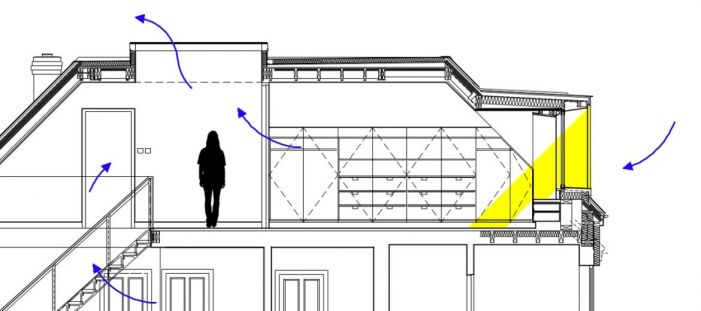Keeping your home cool
Please get in touch with us.
We would love to hear from you about any
project you have in mind
With global warming raising temperatures in summer, keeping your house at a comfortable temperature is important. Whether starting a new build project or refurbishing or extending, here are some ideas to keep your home cool while maintaining design quality.
ORIENTATION
South and west facing rooms will have the greatest solar gain. This is great in winter for heating but the building needs to be carefully designed to mitigate overheating during the hotter months. Setting the glazing back from the elevation or using shading works well. North-facing rooms can, if well insulated, have large areas of glazing as the mass of the house will shade this part of the house. Designing with light and shadow can make a design, so consider what time of day you use a space and the room’s use throughout the year to help design the layout. For example, you may want the sun to warm a window seat in winter or locate an external shade to reduce glare to an area where you have your laptop.

Slot rooflight allows light but also shade. Glass is set back.North facing - large areas of glass and hidden blinds.
EXTERNAL SHADES AND SHUTTERS
These are more effective than blinds and can create some really beautiful shadows and forms. Sliding screens give the best control but are labour intensive to move. External screens are more effective than internal ones and you can still have glimpse out of the interior while providing shading and privacy.

INTERNAL SHADING
Roller blinds or shutters can greatly reduce solar gain. Building them into the design as early as possible will allow these to be hidden into the ceiling or joinery. Electric blinds avoid operating chains or poles and are the best solution where wide glass doors are designed. Choose a solar control fabric that reflects heat back outside.

LANDSCAPE
For existing and new builds, the landscape can play a key role. Trees provide shading and beautiful shadows. Areas of greenery are cooler than hard surfaces that will retain the solar gain from the sun and reflect it back into your home. Having a shaded outdoor table is a great idea but consider the path of the sun to determine the location , along with theh colour and materials for terraces where it sits.

OVERHANGS
Setting back you doors and window or part of the building provides shading and a sense of protection. In our new-build house in Surrey we have designed overhangs to allow the building to be naturally ventilated and private.

CROSS AND STACK VENTILATION
In the early morning and late evening, opening up the windows and doors to the ground floor and the highest window in the house to encourages stack ventilation. Installing an openable grill to your ceiling and a vent to the roof will allow hot air to rise and pull through cooler air from the outside from below. Careful positioning of rooflights and blinds is vital in a roof extension or new build to allow for cooling and air flow, and prevent overheating.

Our Teddington project has carefully positionned windows to allow for cross ventilation and stact ventilation.
SERVICES
For a new-build, highly insulated building, a ground source heat pump to warm and cool your home is a good investment. If you are looking to carry out extensive landscaping as part of your project, run water pipes two metres underground in loops to take advantage of the constant temperature and act as a heat source in winter and heat sink in summer. Air source heat pumps work to a similar principle.
The most important factor in keeping a house cool sustainably is having a design that considers shading, orientation and services from the outset and integrates an insulated envelope and a good thermal mass.

























